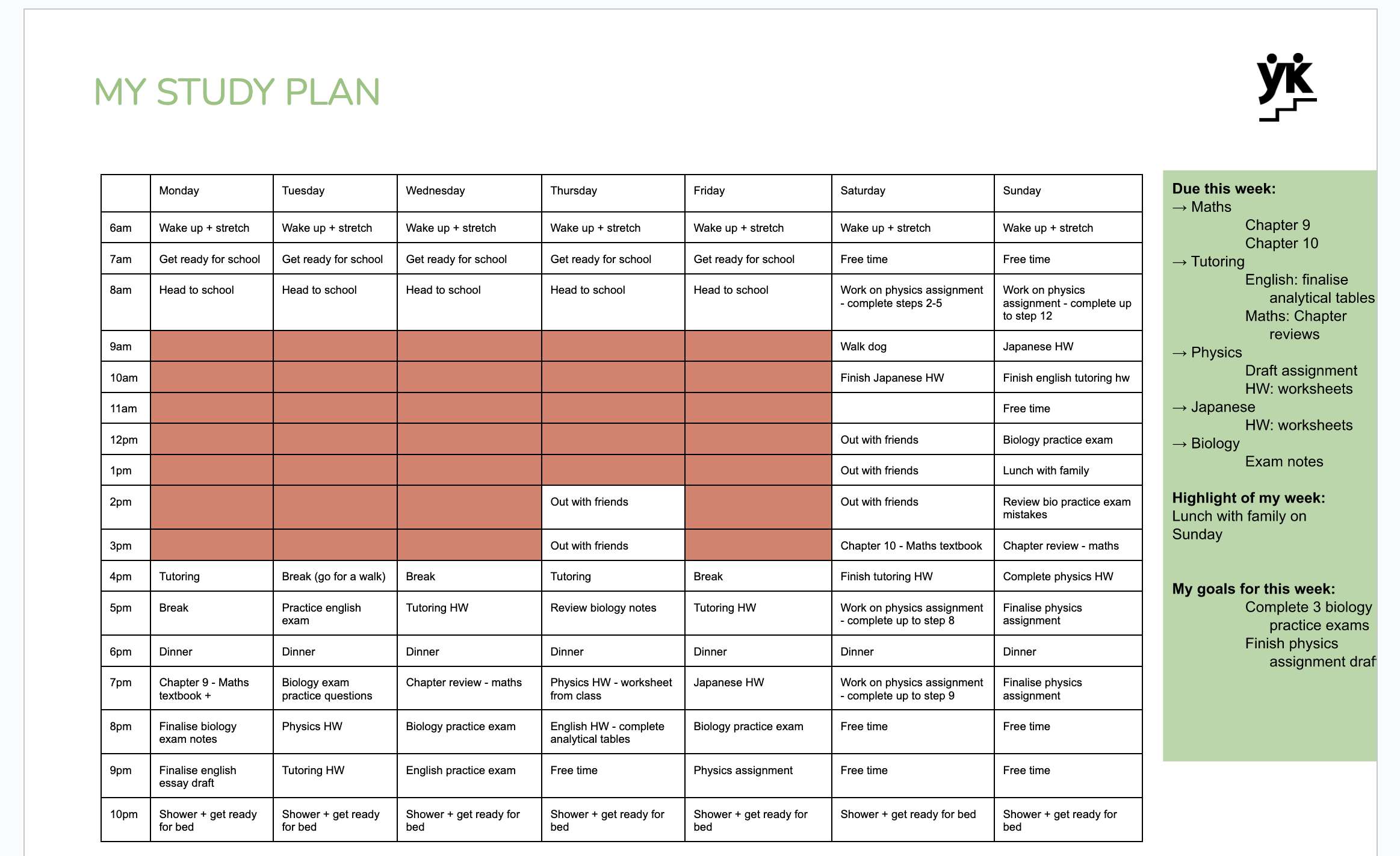
- 4 min read
10 practical ways to combat fatigue and avoid burnout during your exam period

Written by the YK Writing Team
A group of tutors & HSC Band 6 All Rounders led by Yuna.
Many students experience stress during exam periods, and it can be a challenge to study when juggled with your other sporting or co-curricular commitments. It’s very easy to get worn out and burned out when there’s a constant pressure to perform well, study and revise.
In addition to a decline in academic performance, poor mental health, and physical tiredness, fatigue and burnout can have major negative effects. There are definitely measures you can take to combat fatigue and avoid burnout throughout the exam period though.
In this post, we’ll look at 10 practical methods for sustaining your energy and preventing exhaustion during the exam period. These tactics include scheduling regular breaks into your study schedule, eating nutritiously and staying hydrated, exercising frequently, and learning relaxing techniques.
The 10 Practical Methods:
- Set measurable and realistic expectations
- Time management
- Take breaks
- Get enough sleep
- Being Healthy
- Practice self-care
- Connect with others
- Engage in activities you enjoy
- Make a reward system for yourself
- Time efficiency
Remember that everyone’s study needs are different, so it’s important to find what works best for you. By taking care of yourself and practising good study habits, you can avoid burnout and achieve your academic goals.
1. Set measurable and realistic expectations
S – Specific: Your goal should be specific and clear. Rather than setting a vague goal like “improve my grades,” set a specific goal like “Finish chapter 3H”
M – Measurable: Your goal should be measurable so you can track your progress. Determine a specific metric to measure, such as the number of A’s you receive on assignments or the percentage increase in your grades.
A – Achievable: Your goal should be realistic and achievable based on your current circumstances. It’s important to set challenging goals, but also ensure that they are achievable with effort.
R – Relevant: Your goal should be relevant and aligned with your overall objectives. Ensure that your goal is aligned with your long-term academic goals, and it is important to you.
T – Time-bound: Your goal should have a specific timeframe for completion. Set a specific deadline for when you want to achieve your goal.
2. Time management
Related to the previous strategy is setting a realistic study schedule and sticking to it. Prioritise your most challenging subjects or topics and schedule study sessions accordingly. This will help you avoid last-minute cramming and reduce stress.
- Create a study schedule: Plan your study sessions ahead of time and make a schedule that works for you. Make sure to include breaks, meals, and other activities that are important to you.
- Prioritise tasks: Prioritise your tasks according to their importance and urgency. This will help you stay focused on the most important tasks and avoid wasting time on less important ones.
- Use a timer: Set a timer for each study session or task to help you stay on track and avoid getting distracted. This will also help you avoid spending too much time on one task and not enough time on others.
Download our sample study schedule.
3. Take Breaks
Scheduling regular breaks can help you avoid burnout and stay focused. Take short breaks every hour or so to stretch, go for a walk, or do something that relaxes you. You could also schedule longer breaks during the week for going out with friends, exercising, and watching Youtube. What you do in the break is entirely up to you, just make sure you are able to get back into studying when the break is over!
An efficient way to schedule breaks is through the Pomodoro technique which allows you to schedule short breaks in study time. The method works by segmenting your study into quick, concentrated work spurts (typically lasting 25 minutes), followed by a short break (typically 5 minutes).
The purpose of these study sessions, known as “Pomodoros,” is to focus solely on one subject without any interruptions or side tasks. Four Pomodoros are completed before a lengthier break of 15-20 minutes. By cutting your study into manageable halves and avoiding interruptions and distractions, the Pomodoro Technique is meant to keep you concentrated and productive. It can be especially beneficial for those who have a hard time focusing for long stretches of time or who procrastinate a lot.
4. Get enough sleep
Adequate sleep is essential for optimal brain function and memory consolidation. Make sure to get enough sleep each night to feel refreshed and energised for your study sessions. Adults generally need 7-9 hours of sleep each night, while teenagers may need closer to 9 hours. This is why it is so important to stick to a consistent sleep schedule. Try to go to bed and wake up at the same time each day to help regulate your body’s natural sleep-wake cycle.
Another way you can ensure you get enough sleep is to avoid studying right before bed. Studying right before bed can make it difficult to fall asleep and can also interfere with your ability to consolidate and remember information. Also, definitely do not use any caffeine or stimulants before bed as well (duh).
Studying in the morning may be the best option instead of burning the midnight oil, with research suggesting that studying in the morning may be more effective than studying at night, as it allows for better concentration and memory consolidation.
5. Being Healthy
Regular exercise can help you reduce stress and boost your energy levels. Even a short walk or yoga session can help you feel more focused and alert. Furthermore, you should also eat a balanced diet. A healthy, balanced diet can help you maintain optimal brain function and energy levels. Eat plenty of fruits, vegetables, and lean proteins to fuel your body and brain!
6. Practice self-care
7. Connect with others
If you feel overwhelmed or stressed, reach out to a friend, family member, or counsellor for support. Talking to someone about your feelings can help you feel more relaxed and confident.
8. Engage in activities you enjoy
Engaging in activities that you enjoy can help you reduce stress and prevent burnout. Make time for hobbies or activities you enjoy to help reduce stress and improve your overall well-being like reading, team sports. There is no need to give up all your commitments to focus on studying, there just needs to be a good balance and moderation.
9. Make a reward system for yourself
- Determine your goals: Identify your academic goals, such as earning a specific grade or passing a difficult exam. These goals will serve as the foundation for your reward system.
- Identify rewards: Identify rewards that are meaningful and motivating for you. They can be small or big rewards, such as a favourite snack, a movie, a new book, a day trip, or even a vacation.
- Set criteria for earning rewards: Determine specific criteria for earning rewards. For example, you might decide to reward yourself for completing a specific number of study sessions, achieving a certain grade, or mastering a particular concept.
- Create a schedule: Create a schedule for when you will study and when you will receive rewards. This will help you stay on track and give you something to look forward to.
- Track your progress: Keep track of your progress toward your goals and reward milestones. This will help you stay motivated and focused on your goals.
- Celebrate your success: When you achieve your goals, celebrate your success and reward yourself for your hard work.
Remember to choose rewards that are meaningful and motivating for you, and set realistic goals and criteria for earning rewards. A reward system can be a powerful tool to help you stay motivated and achieve academic success.
10. Use time efficiently
Conclusion
Better academic achievement, increased productivity, and enhanced general health and happiness can all result from maintaining a healthy work-life balance. People may attain their goals and have meaningful and balanced lives by prioritising self-care and scheduling time for both work and pleasure.
If you ever need guidance as to what a healthy study/life balance looks like, ask any of our YK tutors. They have been through the same journey as you so they would be more than happy to share their strategies and tips!

